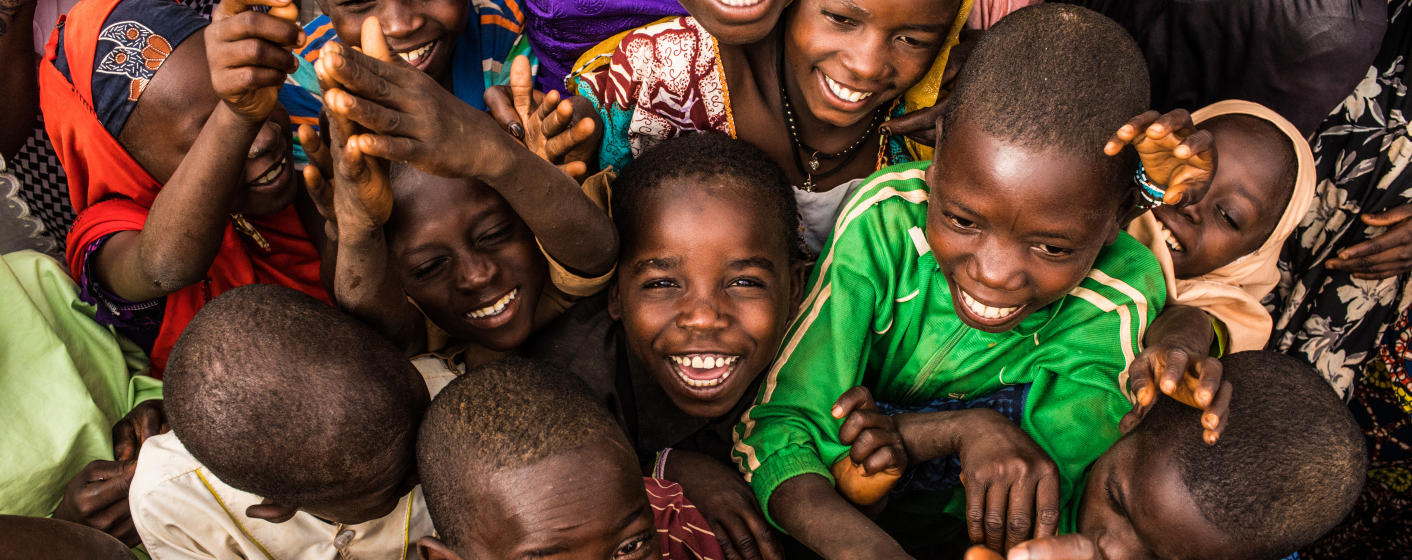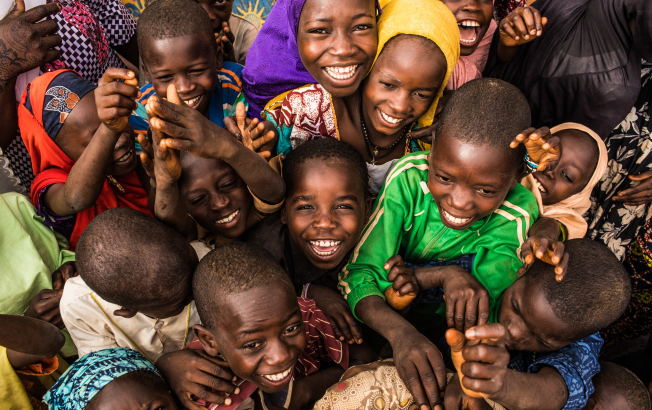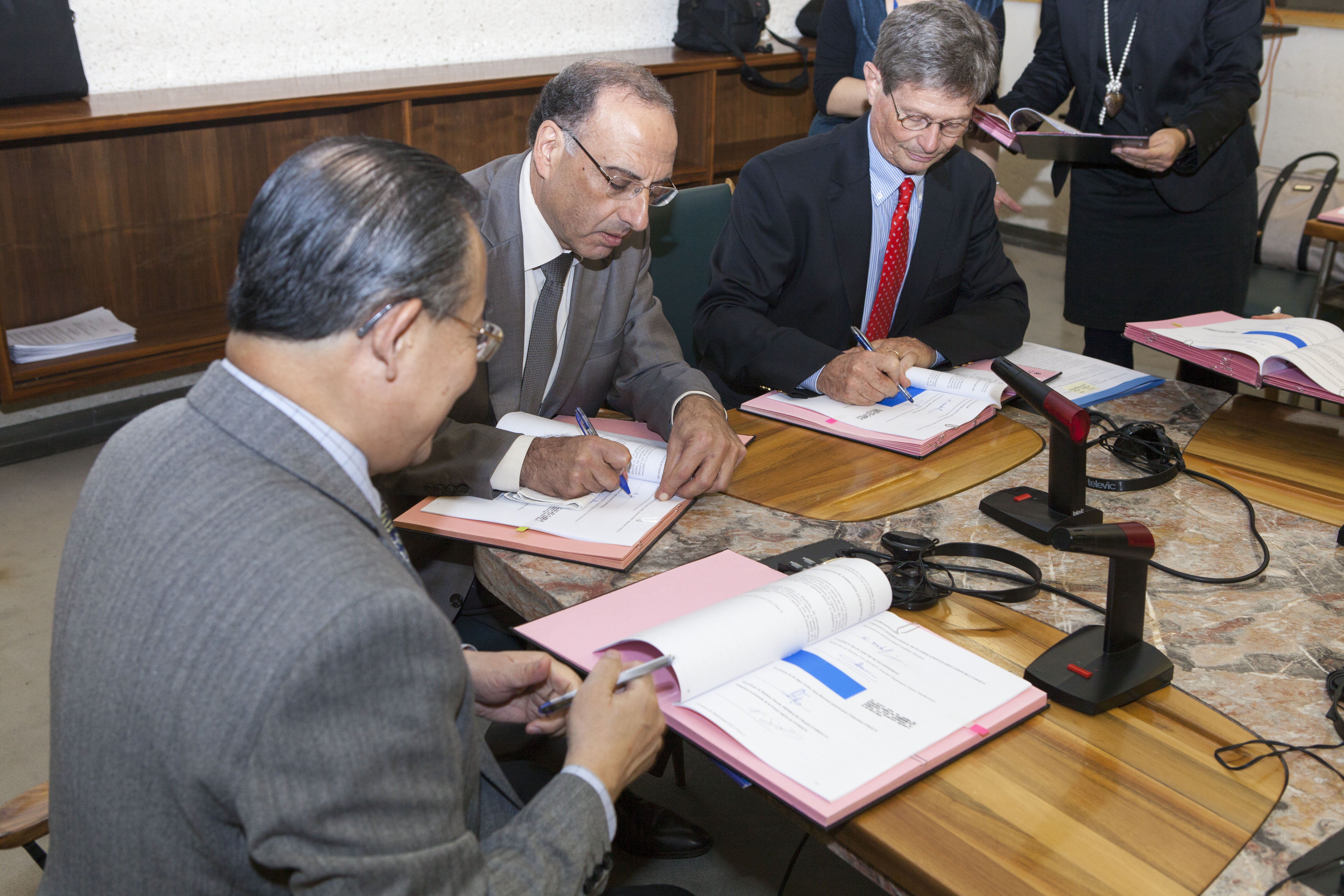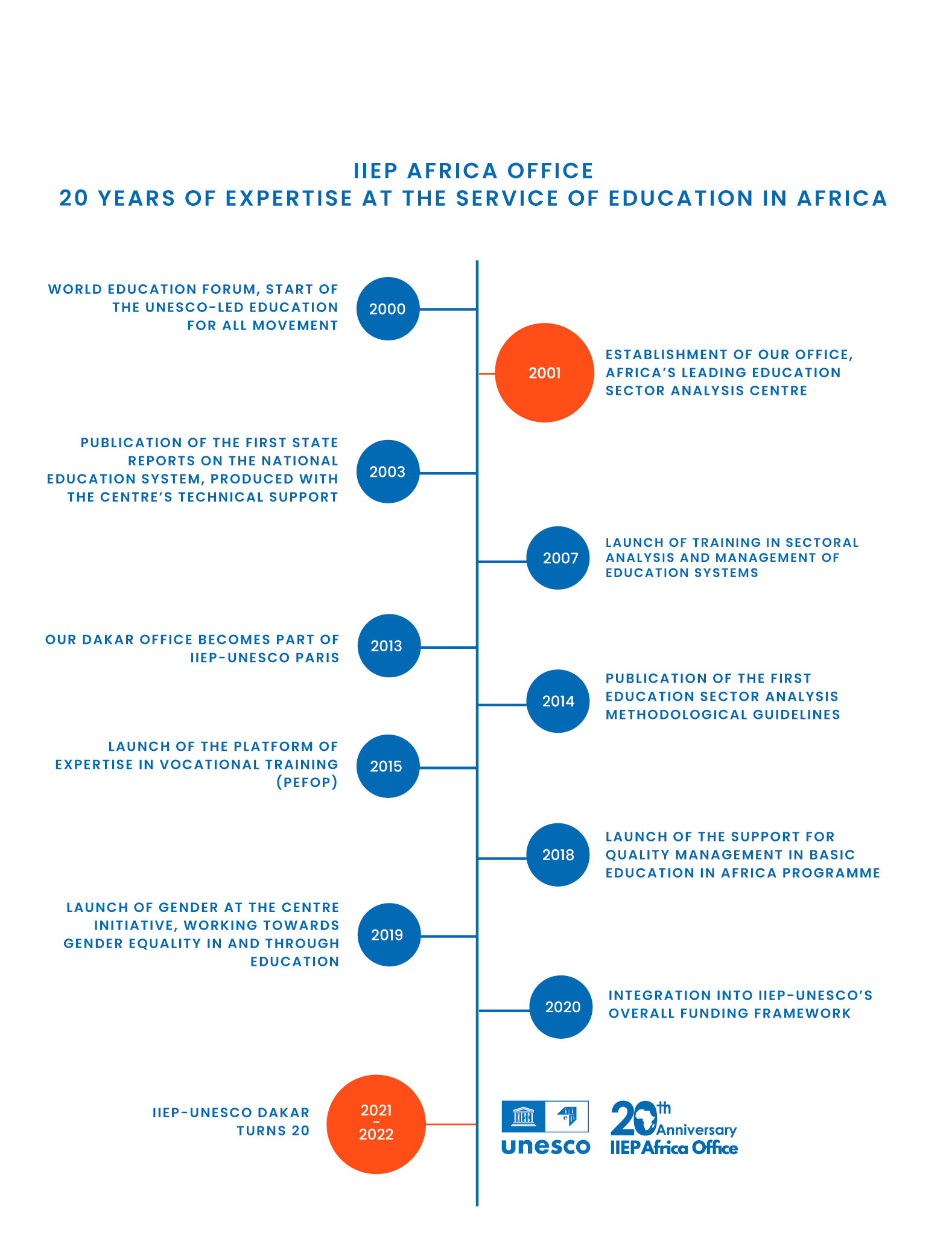IIEP-UNESCO Dakar celebrates its 20th anniversary
Founded in 2001 as the first centre of expertise in education sector analysis in Africa, our Dakar Office has worked to expand its areas of intervention to meet the continent's major education challenges. To mark our 20th anniversary, we look back at key milestones in our history and what the future holds.


To understand how IIEP-UNESCO Dakar came into being, we need to go back to April 2000, when Senegal’s capital was hosting the UNESCO World Education Forum. At the dawn of the new millennium, this event brought together hundreds of national policymakers and delegations from 181 member countries. The aim was to define a new framework for action to achieve “Education for all” by 2015. The international community gathered in Dakar felt that the lack of resources should not stand in the way of schooling and access to quality education. It therefore pledged to support any country with a credible plan to develop education for all.
"Where these processes and a credible plan are in place, partner members of the international community undertake to work in a consistent, coordinated and coherent manner. Each partner will contribute according to its comparative advantage in support of the National EFA Plans to ensure that resource gaps are filled."
2001-2021
A look back at 20 years of action for education in Africa
A few months later, a platform of expertise in education policy analysis – a first on the continent – was set up in Dakar, under the impetus of the French Ministry for Foreign Affairs. This small four-person unit had the task of providing technical support to French-speaking African countries for conducting in-depth analyses of education systems, known as state reports on the national education system. This in-depth assessment of the basic education sector proved to be a crucial instrument for initiating the process of strategic planning in education. Cameroon, Côte d’Ivoire and Guinea were some of the first countries supported by the Pôle de Dakar, which reported to the UNESCO Regional Office for Education in Africa (BREDA).
Strengthening capacities
With around 25 African countries supported during its first ten years, education sector analysis expertise was a central part of Pole’s mission and remains a focus of IIEP-Dakar today. From the outset, the Pôle de Dakar’s approach stood out for its interventions based on a national capacity development approach, working hand in hand with countries’ education ministries. Alongside the production of methodological tools and knowledge, the office launched its first training course in Sectoral Analysis and Management of Educational Systems in 2007 (PSGSE). This programme, delivered in collaboration with Dakar’s Cheikh Anta Diop University, has since trained around 500 African education sector professionals and is now in its 14th year.
New Milestones in 2013
In the early 2010s, as aid to the education sector underwent major changes, the Pôle de Dakar sought to bolster its institutional position and expand into new areas of action. This was encouraged by the French Development Agency (Agence Française de Développement, AFD) the office’s long-time partner and financing agency. On 9th October 2013, an agreement formalised its administrative links with IIEP-UNESCO, paving the way for synergies and new collaborations. Like IIEP-UNESCO Buenos Aires, IIEP-UNESCO Dakar became the second regional office to be attached to the organization’s Paris headquarters. Since this integration, some collaborations with African countries are carried out across all the three offices. The Dakar office was integrated into the headquarters’ funding framework in 2020, opening up new prospects for financing projects on the continent.

New momentum, new projects
Vocational training, issues of education quality management and gender equality have become increasingly important to the office’s activities and staff. This process of diversification at IIEP-UNESCO Dakar, which began in 2015, is a direct response to Sustainable Development Goal 4 set by the United Nations in the same year: “ensure inclusive and equitable quality education and promote lifelong learning opportunities for all.”
Twenty years after it was established, the IIEP office in Dakar is recognised as an authoritative voice in Africa and as a major institution in the field of technical assistance to the education sector. It has increased its ability to leverage funding from multiple donors, and to consider education in all its complexity, both within the scope of its mandate, from early childhood to adult education, but also on issues of education quality and inclusion.
Technical and vocational education and training (TVET)
With the launch of its platform of expertise in vocational training (PEFOP) in November 2015, IIEP-UNESCO Dakar contributes to joint efforts by African governments to promote youth employment and support growth in Africa. First as part of this initiative, and now beyond it, the teams develop and trial innovative approaches with countries, in collaboration with other public and private partners. The aims are to strengthen planning in this sub-sector of education and to facilitate TVET reforms in Africa.
Thanks to the support from IIEP-UNESCO Dakar, our platform for sharing resources has been up and running since 2018. (...) This innovation allows WAEMU member countries and other countries to share their training resources, standards and programmes, so they can adapt them to their own context. This is one of the key decisive results of the consultation framework since its inception.
Support for education quality management
Innovation is also the main feature of the programme to support quality management in basic education, launched three years later in collaboration with several French-speaking African countries. Since 2018, the teams at IIEP-UNESCO Dakar and country partners in the field have been seeking to provide concrete and coordinated solutions that respond to the critical crisis in education that threatens the continent’s future.
We have already learned many lessons from the quality management programme conducted with IIEP-UNESCO Dakar. School inspectors and teachers at Togo’s teacher training colleges are discovering and trialling new practices in schools and are developing the ways in which they support learning. This is the support that Togo needs to improve the quality of learning and help children to succeed.
Gender equality in and through education
The Gender at the Centre Initiative is the other major pillar that reflects how the IIEP’s office for Africa has expanded. Launched in 2019 as part of the G7 summit and coordinated by United Nations Girls’ Education Initiative (UNGEI), this programme aims to strengthen the capacities of eight sub-Saharan African countries to mainstream gender in the development, implementation and monitoring of education policies. As the technical lead of this initiative, the IIEP supports governments, delivers training courses and produces knowledge on the crucial issue of inclusion in African education systems.
Gender-sensitive training in education planning has given me the skills and knowledge I need to prepare reference materials to promote gender equality in education. This is vital for launching strategic initiatives that take into account the specific needs of girls and boys.
Looking to the future
The Dakar office now employs around 40 people, ten times more than it had when it was first established 20 years ago. In the aftermath of a global pandemic that has severely impacted already-stretched education systems, the IIEP’s activity in Africa is set to be stepped up even further across the continent. A key focus will be supporting the operational implementation of educational reforms and policies set out in partner countries’ education sector plans.
IIEP’s Medium Term Strategy (2022-2025) commits us to focusing 50% of our portfolio in continental Africa. Building on the work of Pole de Dakar, our IIEP-Dakar office will lead the organization’s efforts to support continental capacity for planning and management of educational systems, reinforcing achievement of the sustainable development goals.
Five key challenges for education in Africa
With eight years until the 2030 deadline, funding for education, quality learning, demographics, inclusive education and youth employment remain major challenges for the continent’s future. To respond to the continent’s growing needs in the area of educational planning and management, IIEP-UNESCO Dakar is now seeking to accelerate its impact on the ground by developing key partnerships with leading institutional and academic partners on the continent.
In 20 years, we’ve helped so many African countries to develop credible and sustainable education policies. This historic expertise of the IIEP-UNESCO Dakar office is indispensable but is not enough on its own. Our role today is to support all the continent’s countries throughout the educational planning cycle, and to boost our presence alongside them when implementing education plans and policies.
Africa and Gender Equality are UNESCO’s two global priorities. IIEP’s objective is that at least 50% of IIEP’s country programme budget goes to Africa and 100% of IIEP projects mainstream gender, at least partially.
IIEP-UNESCO 11th Medium-Term Strategy, 2022-2025

